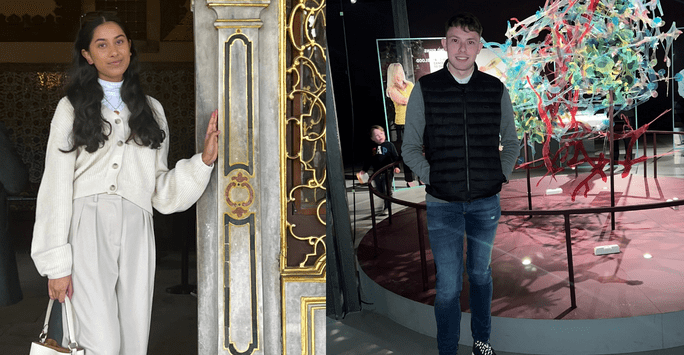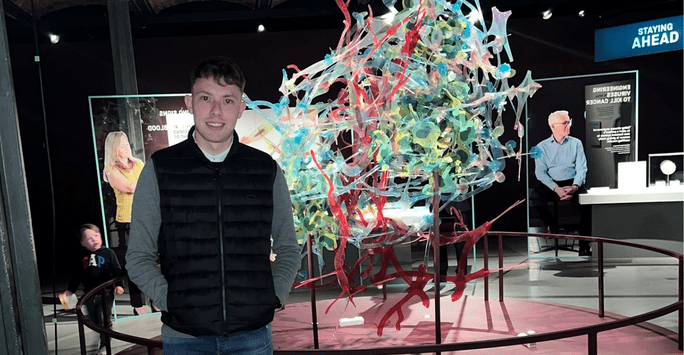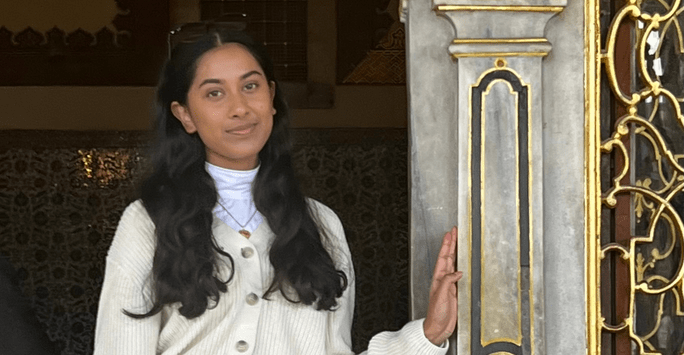
Student Spotlights pass the mic to our student doctors, to hear their take on their School experience and shine the light on a particular role, team or pathway through the School of Medicine.
Over 100 Liverpool student doctors are taking a year out from the MBChB programme this year to earn themselves an intercalated degree and deepen their knowledge in a subject they are particularly passionate about.
More than half of these have chosen to intercalate at the University of Liverpool, benefiting also from Liverpool-based scholarships and awards to support their studies. We caught up with James Birch-Ford and Anjum Aarifa Khanom to see how they were finding their courses one semester in.
James Birch-Ford is completing an MSc in Cancer Biology and Therapy, while Anjum Aarifa Khanom is taking an MRes in Clinical Sciences.
Why this choice of intercalation programme?
James: I was fascinated by how such small mutations at a genetic level can lead to such a catastrophic disease; cancer. My family has been affected by cancer and so many other families also.
I am passionate about learning about this disease and developing the skills, knowledge and contacts to hopefully have a role in cancer research in the future.
This intercalation programme has a good balance in teaching cancer biology on the cellular level as well as statistical, bioinformatical and biotechnological knowledge that are core skills in planning and executing a lab project.
Aarifa: The MRes was initially suggested to me by my RS3 supervisor, who asked if I would like to continue research work with her beyond RS3. At the time, I was a little intimidated of taking on an MRes and was going to apply for a different intercalation programme. However, my supervisor’s advice prompted me to look into this MRes further, and I realised that the programme offered a lot of flexibility to conduct your research work, as well as emphasising critical appraisal, statistical analysis and oral/poster presentation skills – all of which are essential to building an academic career.
 James Birch-Ford, MSc Cancer Biology and Therapy
James Birch-Ford, MSc Cancer Biology and Therapy
What are you most enjoying about the programme so far?
James: This semester has been mostly developing the research skills such as biotechnology, computational biology and learning R studio to perform various statistical analysis. While I enjoyed those, I am more so enjoying my current research module where I am writing a literature review around diagnostic tests and biomarkers for the earlier detection of pancreatic cancer guided by an expert in the field. I am looking forward to learning about cancer biology and the hallmarks of cancer next semester.
Aarifa: I am really enjoying how simply being on the MRes provides a wealth of opportunities to start building an academic career that works alongside a clinical one.
You have weekly contact with a lot of experienced researchers who are both happy to discuss their work and involve you in it if you ask.
Best of all, is that the MRes has low contact hours, compared to clinical years on the MBChB, and therefore you have the time and flexibility in your schedule to take advantage of these opportunities.
What have you found the most challenging?
James: The most challenging part of doing an MSc is the number of assessments that you have. Each module is assessed a few times per semester but when you have three modules in semester one and two, as well as a research module spanning both, the workload can build up. This forces you to be organised and proactive to get the assignments done but you have more than enough time to do this and socialise with friends also.
Aarifa: I probably found the initial two laboratory skills weeks quite challenging, as I wasn’t familiar with lab work. However, most of the cohort were in the same position as me, and the module facilitators were always very understanding and easy-going. We got it by working together and getting in contact with the facilitators, who were always happy to help.
Does the reality of the programme differ at all from your expectations?
James: I researched my MSc heavily before deciding that it was what I wanted to do this year, and that is important.
In general most intercalation opportunities have really good information on what you will be taught and how it will work, and I would recommend looking through this. I had no surprises!
Aarifa: Since your independent research project is overseen by your supervisor, most of the contact you have with the MRes course are for other modules, such as transferable skills, and Research Frontiers critical appraisal sessions. These types of sessions give the course a lot more variety than I was initially anticipating, and it’s really interesting to hear about work from different fields.
 Anjum Aarifa Khanom, MRes Clinical Sciences
Anjum Aarifa Khanom, MRes Clinical Sciences
What are you most looking forward to accomplishing by the end of the academic year?
James: I am looking forward to completing my lab project, it will be the first time I will have the chance to complete hands on research, get a set of results and analyse these for significance.
Aarifa: I am most definitely looking forward to completing my independent research project. I’m really enjoying working on it, and I think it’ll be a big personal milestone for me once it’s finished. Going forward, I believe it’ll serve as a platform onwhich I can further build an academic career.
Do you have any words of wisdom for Year 3 students currently weighing up their intercalation options?
James: Intercalation is a great opportunity to gain more knowledge of a field you are interested in, I would without a doubt recommend it for students who would wish to conduct research when they qualify as a doctor.
It is the best opportunity for you to do an BSc, MSc or MRes and it allows you to take a break from medicine but not a break from putting the work in.
Aarifa: Firstly, whether it’s on the MRes Clinical Sciences or not, I strongly encourage intercalation. It’s only once you’re on a programme that you realise the value of making your own opportunities through networking – and that yes, it’s possible to network beyond RS3 as a third year undergraduate. There is of course a financial obligation when choosing to intercalate.
As a recipient of a School of Medicine Scholarship myself, I strongly encourage looking into the variety of funding opportunities out there, from the School, and externally, to support you in considering intercalation as an option.
With regards to a specific course, I think the MRes Clinical Sciences is great for people who both do and don’t know which specialty they want to go into. For those that have a particular speciality in mind, the MRes has four specialities that it offers a variety of projects in – and if your particular specialty isn’t available, you can get in touch with the programme and they will likely facilitate this for you.
If you don’t have a preferred specialty, the variety of transferable skills taught on the course are invaluable, and going forwards, involvement in research will always be beneficial for your CV.
Discover more
- James and Aarifa were both recipients of School of Medicine Intercalation Scholarships, available to support selected programmes at the University of Liverpool. Information about applications for these Scholarships for the 23-24 academic year will be shared shortly.
- Join the Intercalation team at their Pop-up at the Student Hub in Cedar House on Friday 10th February at 12.30 to have all your burning intercalation questions answered.
- Browse a wide range of resources – from student stories to recordings by previous intercalators and academics – to support your Intercalation choices, all available on the Intercalation section of the student intranet (link).
- Interested in intercalating at the University of Liverpool? You’re spoilt for choice! Head over to the Study with us > Intercalation web area (link) to see your options.
- Get in touch with mednews@liverpool.ac.uk if you are interested in stepping into the Student Spotlight or would like to nominate a student or group to do so.